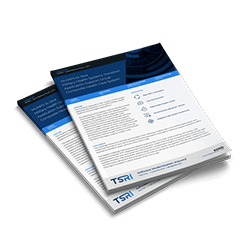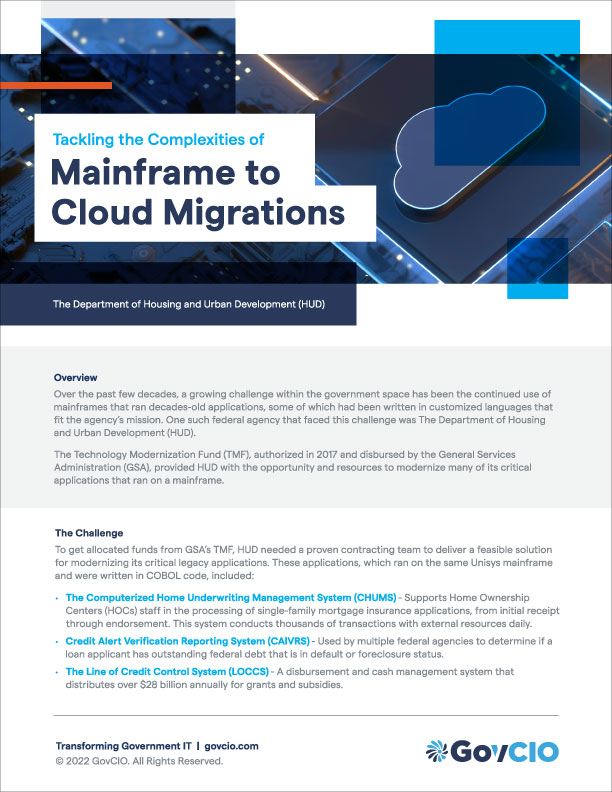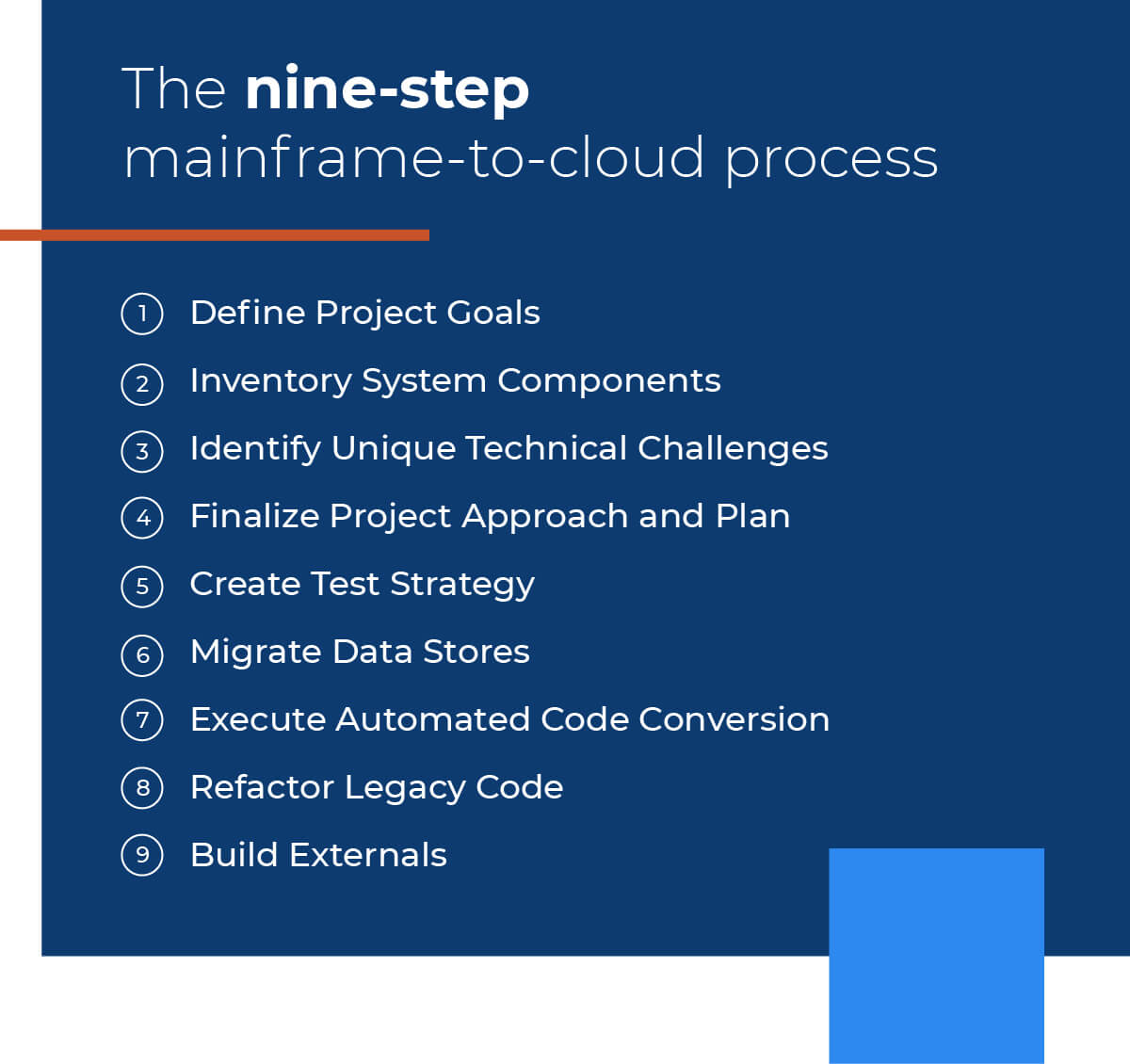Displaying items by tag: Code Transformation
Jovial to C++ TRW MILSTAR Satellite
MILSTAR (Military Strategic & Tactical Relay) is the tactical and strategic multiservice satellite system designed to provide survivable communications for U.S. forces worldwide. The system needed to achieve higher data-rate modes than the low and medium-data-rate modes of the older generation MILSTAR satellites which were written in J3 JOVIAL software technology. This required the JOVIAL code to be modernized, which enabled the system's operation on newer hardware with simplified maintenance.
 |
Customer: US Air Force & Northrop Grumman (Formerly TRW) Source & Target Language: Jovial to C++ Lines of Code: 143,000 Duration: 1 Month Services: Code Assessment, Automated Code Transformation, Automated "As-Is” Documentation, Use of JANUS Studio® Toolset, Transformation Blueprint®
|
Taking a Low-Risk Approach to Mainframe Modernization — HUD

How do you transform the slow pace of technological innovation within a federal agency into an opportunity for innovation and IT systems modernization? Start by taking a cue from the partnership between TSRI and GovCIO. With backing from the Federal Government’s Technology Modernization Fund (TMF) our joint teams propelled the US Department of Housing and Urban Development (HUD) from an outdated twentieth-century Unisys COBOL system into modern, service-oriented Java that was performant and functionally equivalent.
TSRI worked with GovGIO on their process designed to successfully migrate the applications to the Microsoft Azure cloud. They started by defining the five key project goals and taking an inventory of system components, including intersecting platforms. Once we had identified what the unique technical challenges were and how to address each, we created testing strategies and migrated the data stores for each system. Finally, we executed an automated code conversion and refactored the legacy COBOL code.
TSRI’s partnership with GovCIO executed a rapid, holistic mainframe migration process for HUD that has improved their organizational performance while minimizing risk. On day one after the productions systems were switched over from the Unisys mainframe to the Microsoft Azure cloud, the new system supported 25,356 users and 299,715 transactions with only three user problems reported. These are the HUD systems that manage, store, and protect all the personal financial and employment-related eligibility information for FHA insured financing. Given the criticality of the data managed every day by HUD, it was important that the migration run without impact on operations. The result could be seen in the first 30 days during which the new system disbursed just over $2.7 billion dollars in HUD program funds without a single error.
 Review the details of how TSRI and GovCIO successfully executed this complex modernization project in our recently published case study.
Review the details of how TSRI and GovCIO successfully executed this complex modernization project in our recently published case study.
The 9 Low-Risk Steps That Led to Success
You might be surprised that HUD and other government agencies still run their IT on mainframes using COBOL (first released in the 1950’s), or MUMPS (from the 1970’s). Running on these aging platforms presents an extensive list of challenges to these agencies: data management, growing storage, collaboration, security, etc. The modernization process typically involves risk, time, and significant expense. It’s understandable that a large agency like HUD would want to select a partner they knew could deliver a low-risk, high-accuracy result.
Working together, we adhered to GovCIO’s nine-step best-practices process that resulted in modernizing systems to modern cloud architectures that can now evolve with HUD, while preventing negative impacts to their mission, day-to-day operations, and security.

For more details on the nine-step process that enabled HUD to enter the cloud age, read our latest white paper with GovCIO.
A first-person account of HUD’s modernization process with Roger Knapp – Executive Vice President and HUD Program Manager
Only a few engineers know what it feels like to lead a major government agency through an automated mainframe modernization. Roger Knapp is one of them and has been working in the field for over 30 years. As Executive VP of Engineering & Service Delivery at TSRI, Roger has unique insights on the HUD project. He sat down to share them in an interview with GovCIO as part of their Partner Spotlight.
In a short chat, he shares how the TSRI-GovCIO team overcame the challenges not only of modernizing a nationally mission-critical system at risk of obsolescence, but also how to deal with the presence of dynamic SQL data in the legacy application logic.
Get the story straight from Roger in his interview with GovCIO.
TSRI is Here for You
As a leading provider of software modernization services, TSRI enables technology readiness for the cloud and other modern architecture environments. We bring software applications into the future quickly, accurately, and efficiently with low risk and minimal business disruption, accomplishing in months what would otherwise take years.
Unisys COBOL to Java Department of Housing and Urban Development
The U.S. Air Force uses the Integrated Logistics System – Supply (ILS-S), of which the Standard Base Supply System (SBSS) is a major part, as a mainstay of their supply chain. The SBSS program includes over 1.5 million lines of COBOL, as well as smaller numbers of C and Assembly, all of which are to be transformed into Java.
- Customer & Integrator: US Air Force
- Source & Target Language: COBOL to Java
- Lines of Code: 1.5 million
- Duration: 11 months
-
Ada to Java and C++ - ITT / SENSOR
ITT Corporation awarded a sole-source contract to TSRI for modernization of the COBRA DANE Radar Calibration System (SCRS) of the Ballistic Missile Early Warning System (BMEWS) under the Air Force’s System Engineering & Sustainment Integrator (SENSOR) program.
- Customer & Integrator: US Air Force/ITT
- Source & Target Language: Ada to Java/C++
- Lines of Code: 380,300
- Duration: 8 months
- Services: Code Transformation, Automated Refactoring, System Integration, Testing & Implementation Support, Final “To-Be” Documentation
- ada
- C++
- Java
- itt
- Code Transformation
- Automatic Refactoring
- Final ToBe Documentation
- System Integration and Test Support
- System Integration
- usaf
- US Air Force
- modernization
- Refactor
- Refactoring
- html
- Remove Dead Code
- Common Coding Standards
- Software code Conversion
- Software Modernization
- ada to c++
- Software Design
COBOL to C# - Retail Client
A $39 billion clothing retailer with 4,300 stores worldwide sought to modernize its suite of mainframe COBOL supply chain applications. These applications supported the client’s unique business process, which provided them with a major competitive advantage and fueled years of unprecedented growth. Today, the clients business logic was preserved and their services are hosted on Azure with data integration directly through service bus queues and scheduling handled via Logic Apps.
 |
Customer: Retail Client Source & Target Language: COBOL to C# Lines of Code: 86,000 Duration: 3 months Services: Code Transformation, Automated Refactoring, Testing and Implementation Support, Transformation Blueprint®
|
Ada to C++ - Raytheon - TCS / MCS
Navy Multi-band Terminal (NMT) is a SATCOM terminal, which expands available bandwidth and provides support for ForceNet, the Navy's approach to network-centric operations. TSRI transformed the legacy Ada code to C++, and refactored the modernized application.
- Customer & Integrator: Raytheon & US Navy
- Source & Target Language: Ada to C++
- Lines of Code: 89,000
- Duration: 5 months
- Services: Automated Code Transformation, Transformation Blueprint, System Integration and Test Support, Automated Refactoring
Ada to C++ - US Navy - Modem Control Software
TSRI was engaged to modernize US Navy SATCOM Multi-band Terminal (NMT) Modem Control System (MCS) from Ada to C++. To provide SPAWAR with the best modernization approach, Raytheon selected TSRI to transform the existing MCS Ada code into C++ and to re-factor
the C++ toward the desired target architecture. TSRI's fixed-price "integrator ready" deliverable was selected by Raytheon for its low technical risk,
shortened schedule, and low cost.
- Customer & Integrator: US Navy & Raytheon
- Source & Target Language: Ada to C++
- Lines of Code: 190,000
- Duration: 5 months
- Services: Automated Code Transformation, Application Blueprint®, Transformation Blueprint®, Engineering Support, Automated Refactoring
COBOL to Java - Comture Japanese Car Manufacturer
One of the largest Japanese Car Manufactures now uses TSRI’s modernization methods to increase efficiency in their manufacturing systems. With the help of systems integrator Comture Corporation, TSRI was able to successfully transform 120k lines of COBOL to Java, in a three-week time-period, with over 99% automation levels.
 |
|
- Java
- cobol
- transformation blueprint
- Code Transformation
- Automatic Refactoring
- Application Blueprint
- car manufacturer
- japan
- japanese
- automation
- documentation
- COBOL to Java
- agility
- agile
- architecture
- Software code Conversion
- db2
- ibm
- VSAM
- oracle
- cics
- Tomcat Server
- SonarQube
- Quality Scans
- Code conversion
United States Air Force - Unisys COBOL to Java ILS-S SBSS Logistics System Modernization
The U.S. Air Force uses the Integrated Logistics System – Supply (ILS-S), of which the Standard Base Supply System (SBSS) is a major part, as a mainstay of their supply chain. The SBSS program includes over 1.5 million lines of COBOL, as well as smaller numbers of C and Assembly, all of which are to be transformed into Java.
- Customer & Integrator: US Air Force
- Source & Target Language: COBOL to Java
- Lines of Code: 1.5 million
- Duration: 11 months
-
COBOL to C++ - Premera Blue Cross
Premera Blue Cross required the assessment, transformation and re-factoring of its existing Automated Document Assembly System (ADAS). ADAS was written in WANG COBOL and self generated WANG COBOL programs tailoring health care booklets for specific customer needs. TSRI was selected to assess, transform, and re-factor the WANG COBOL code, migrating the system into a C++ Windows NT environment with full functional equivalency.
 |
Customer: Premera Blue Cross Source & Target Language: COBOL to C++ Lines of Code: Nearly 50,000 Duration: 4 Months Services: Code Transformation, Automated Refactoring, Testing and Implementation Support, Transformation Blueprint®
|

